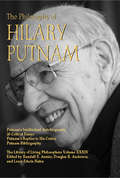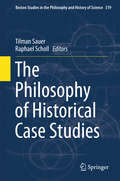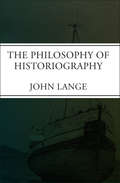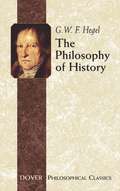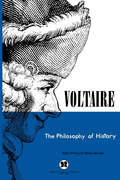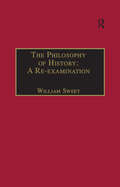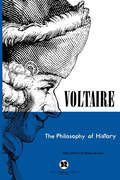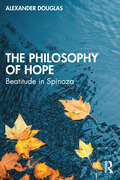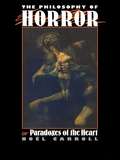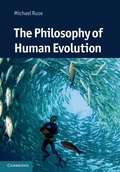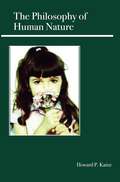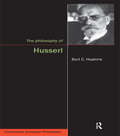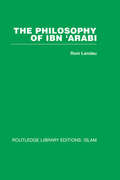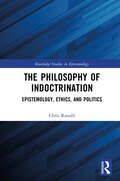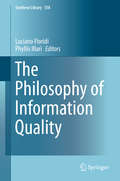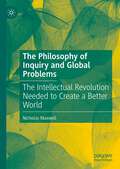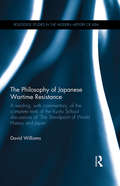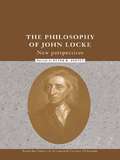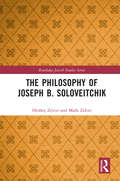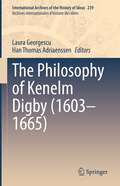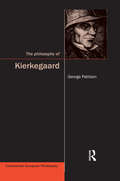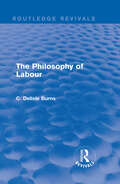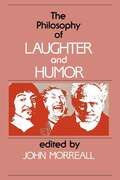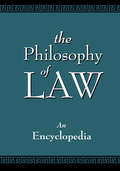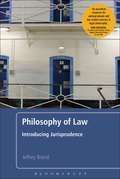- Table View
- List View
The Philosophy of Hilary Putnam
by Randall E. Auxier Douglas R. Anderson Lewis Edwin HahnHilary Putnam, who turned 88 in 2014, is one of the world's greatest living philosophers. He currently holds the position of Cogan University Professor Emeritus of Harvard. He has been called "one of the 20th century's true philosophic giants" (by Malcolm Thorndike Nicholson in Prospect magazine in 2013). He has been very influential in several different areas of philosophy: philosophy of mathematics, philosophy of language, philosophy of mind, and philosophy of science. This volume in the prestigious Library of Living Philosophers series contains 26 chapters original to this work, each written by a well-known philosopher, including the late Richard Rorty and the late Michael Dummett. The volume also includes Putnam's reply to each of the 26 critical and descriptive essays, which cover the broad range of Putnam's thought. They are organized thematically into the following parts: Philosophy and Mathematics, Logic and Language, Knowing and Being, Philosophy of Practice, and Elements of Pragmatism. Readers will also appreciate the extensive Intellectual Autobiography.
The Philosophy of Historical Case Studies
by Tilman Sauer Raphael SchollThis volume collects reflections on the role of philosophy in case studies in the history of science. Case studies have played a prominent role in recent history and philosophy of science. They have been used to illustrate, question, explore, or explicate philosophical points of view. Even if not explicitly so, historical narratives are always guided by philosophical background assumptions. But what happens if different philosophies lead to different narratives of the same historical episodes? Can historical case studies decide between competing philosophical viewpoints? What are the criteria that a case study has to fulfill in order to be philosophically relevant? Bringing together leading practitioners in the fields of history and philosophy of the physical and the life sciences, this volume addresses this methodological problem and proposes ways of rendering explicit philosophical assumptions of historical work.
The Philosophy of Historiography
by John LangeA philosophical examination of the study of history, from its logic and semantics to its metaphysical and epistemological implications. This book is intended for the highly intelligent reader, who is interested in considering the difficulties, problems, and challenges of understanding and writing about the human past. It is popularly enough written, hopefully, to be a joy to read, and scholarly enough to be seriously instructive. The book has two major purposes, first, to give a reader an extensive, detailed overview of the field as it currently exists, and, second, to considerably enlarge the field itself, as it is the first book in the area to consider not only the epistemology of the field, but, in detail, its logic and semantics, its metaphysics, its axiology and its aesthetics.
The Philosophy of History
by Charles Hegel C. J. Friedrich J. Sibree Georg Wilhelm Friedrich HegelHegel wrote this classic as an introduction to a series of lectures on the "philosophy of history." With this work, he created the history of philosophy as a scientific study. He reveals philosophical theory as neither an accident nor an artificial construct, but as an exemplar of its age.
The Philosophy of History
by Voltaire Thomas KiernanHave you ever wondered how different worldviews have shaped history? How dominant religious or political groups have changed the way past events have been interpreted, written, and recorded? Voltaire, the greatest philosophical mind to come out of the Enlightenment, has tackled these very questions in his essay The Philosophy of History. Voltaire attempts to reinterpret the moral, aesthetic, and religious views and the customs and practices that prevailed in ancient civilizations. In The Philosophy of History, he takes a philosophical look through history from different races of man to legislators who have spoken in the name of the Gods. This enthralling essay is an essential read for scholars and students of the Enlightenment. The Philosophy of History was first published in London in 1776 and is a typical representation of Voltaire's attitude toward life and reality. His prime concern was to disprove and demolish the established notions that governed contemporary affairs; they were, in his penetrating view, patently ridiculous. He spread his iconoclastic aim throughout his work. The model for all subsequent dissenters, Voltaire wrote with courage and conviction most importantly, with controlled genius that lent to his words and ideas a strength and aggregate that has resisted the erosive influence of time. This ebook is derived from the original edition published in 1776, with a preface by Thomas Kiernan
The Philosophy of History: A Re-examination
by William SweetThe philosophy of history is an area of interest not only to philosophers, but to historians and to social scientists. It has been of central importance in continental European philosophy since the late 18th century, and for the past half-century has had a significant place in Anglo-American philosophy. Interest in the philosophy of history continues to grow. This volume offers both an introduction to contemporary discussion in the philosophy of history, and a 'reassessment' of some of the major movements in the philosophy of history since the beginning of the 20th century. Including the work of leading international scholars in the field, the book presents a wide range of perspectives from different schools in philosophy, and in political and social theory, history, and the history of ideas. Traditional questions raised in the philosophy of history are explored with fresh insight - the nature of history; historical understanding; historical objectivity; the nature of the past; the psychological factors in historical explanation; the human significance of history - alongside issues which are less frequently examined including: the role of science and mathematics in history, history as a social science, and history as an art form. As history itself remains disputed ground, it is important to consider what clues history can provide for our response to issues of contemporary concern such as political realignments and economic globalisation; this volume offers important insights from leading scholars in the philosophy of history.
The Philosophy of History: Or A Philosophical And Historical Dissertation, On The Origin, Manners, Customs, And Religion Of The Different Nations, And People Of Antiquity
by VoltaireThe great Enlightenment thinker shares his views on the nature and practice of history in this fascinating critique of historical narratives. In The Philosophy of History, Voltaire present a radical reinterpretation of the moral, aesthetic, and religious views and the customs and practices that prevailed in ancient civilizations. His critique touches on a range of topics, from cultures across the globe to legislators who spoke in the name of the gods. This enthralling essay is an essential read for scholars and students of the Enlightenment. This ebook is derived from the original edition published in 1776, with a preface by Thomas Kiernan.
The Philosophy of Hope: Beatitude in Spinoza
by Alexander DouglasCan philosophy be a source of hope? Today it is common to believe that the answer is no – that providing hope, if it is possible at all, belongs either to the predictive sciences or to religion. In this exciting and stimulating book, however, Alexander Douglas argues that the philosophy of Spinoza can offer something akin to religious hope. Douglas shows how Spinoza is able, without appealing to belief in any traditional afterlife or supernatural grace, to develop a profound and original theory of how humans can escape from the conditions of death and sin. Douglas argues that this theory of escape, which Spinoza calls beatitude, is the centrepiece of his entire philosophy, though scholars have often downplayed or ignored it. One reason for this scholarly neglect might be the difficulty of understanding Spinoza’s theory, which departs from the standard doctrines and methods of Western philosophy. Douglas's interpretation therefore seeks inspiration beyond the Western tradition, drawing especially on the classical Daoist text Zhuangzi and its commentaries. Here, Douglas argues, surprising resonances with Spinoza’s core ideas can be found, leading to a new way of understanding his strange yet compelling theory of beatitude.
The Philosophy of Horror: Or, Paradoxes of the Heart
by Noel CarrollNoel Carroll, film scholar and philosopher, offers the first serious look at the aesthetics of horror. In this book he discusses the nature and narrative structures of the genre, dealing with horror as a "transmedia" phenomenon. A fan and serious student of the horror genre, Carroll brings to bear his comprehensive knowledge of obscure and forgotten works, as well as of the horror masterpieces. Working from a philosophical perspective, he tries to account for how people can find pleasure in having their wits scared out of them. What, after all, are those "paradoxes of the heart" that make us want to be horrified?
The Philosophy of Human Evolution
by Michael RuseThis book provides a unique discussion of human evolution from a philosophical viewpoint, looking at the facts and interpretations since Charles Darwin's The Descent of Man. Michael Ruse explores such topics as the nature of scientific theories, the relationships between culture and biology, the problem of progress and the extent to which evolutionary issues pose problems for religious beliefs. He identifies these issues, highlighting the problems for morality in a world governed by natural selection. By taking a philosophical viewpoint, the full ethical and moral dimensions of human evolution are examined. This book engages the reader in a thorough discussion of the issues, appealing to students in philosophy, biology and anthropology.
The Philosophy of Human Nature
by Dr Howard P. KainzWhat, exactly, is human nature? What makes humans different from animals (if there is any difference)? <P><P>In this book, Howard Kainz presents a philosophical analysis of the various concepts of human nature and the many controversies that have surrounded them for centuries. He explores issues such as whether human beings are truly free, whether human instincts differ from animal instincts, and the realities of human maturity.
The Philosophy of Husserl (Continental European Philosophy Ser. #11)
by Burt HopkinsAs the founder of phenomenology, Edmund Husserl has been hugely influential in the development of contemporary continental philosophy. In The Philosophy of Husserl, Burt Hopkins shows that the unity of Husserl’s philosophical enterprise is found in the investigation of the origins of cognition, being, meaning, and ultimately philosophy itself. Hopkins challenges the prevailing view that Husserl’s late turn to history is inconsistent with his earlier attempts to establish phenomenology as a pure science and also the view of Heidegger and Derrida, that the limits of transcendental phenomenology are historically driven by ancient Greek philosophy. Part 1 presents Plato’s written and unwritten theories of eidê and Aristotle’s criticism of both. Part 2 traces Husserl’s early investigations into the formation of mathematical and logical concepts and charts the critical necessity that leads from descriptive psychology to transcendentally pure phenomenology. Part 3 investigates the movement of Husserl’s phenomenology of transcendental consciousness to that of monadological intersubjectivity. Part 4 presents the final stage of the development of Husserl’s thought, which situates monadological intersubjectivity within the context of the historical a priori constitutive of all meaning. Part 5 exposes the unwarranted historical presuppositions that guide Heidegger’s fundamental ontological and Derrida’s deconstructive criticisms of Husserl’s transcendental phenomenology. The Philosophy of Husserl will be required reading for all students of phenomenology.
The Philosophy of Ibn 'Arabi
by Rom LandauOriginally published 1959. Ibn ‘Arabi is one of the most significant thinkers of Islam. Yet he is far less widely known in the Western world than Ibn Sina, Al-Ghazali, Ibn Rushd or even Al Farabi. This volume provides original interpretations and illustrations to some of Ibn ‘Arabi’s ideas, as well as including a number of his texts in English.
The Philosophy of Indoctrination: Epistemology, Ethics, and Politics (Routledge Studies in Epistemology)
by Chris RanalliThis book develops and defends a novel social epistemological account of indoctrination. It answers important epistemological, ethical, and political questions about what indoctrination is, why it is epistemically harmful, how it can be practiced, and how we should talk about indoctrination.The author presents three views related to the epistemology of indoctrination. First, he argues that indoctrination is most fundamentally a structural epistemic phenomenon which results in closed-minded beliefs. The sources of indoctrination are diverse: institutional structures, technological systems, ideological frames, and individual actions. What unites them is that they lead to the systematic failure to consider seriously the relevant alternatives to what we are taught, whether by accident or by design. Second, he makes the case that indoctrination is always wrong because it disrespects agents in their capacity as epistemic agents, even when it results in true belief. Third and finally, he contends that public indoctrination-ascriptions are political propaganda; they function to promote political agendas, which can, ironically, breed the conditions for indoctrination rather than forestall it.The Philosophy of Indoctrination is an essential resource for researchers and advanced students working in social and political epistemology, ethics, political philosophy, philosophy of education, and terrorism and radicalization studies.
The Philosophy of Information Quality (Synthese Library #358)
by Luciano Floridi Phyllis IllariThis work fulfills the need for a conceptual and technical framework to improve understanding of Information Quality (IQ) and Information Quality standards. The meaning and practical implementation of IQ are addressed, as it is relevant to any field where there is a need to handle data and issues such as accessibility, accuracy, completeness, currency, integrity, reliability, timeliness, usability, the role of metrics and so forth are all a part of Information Quality.In order to support the cross-fertilization of theory and practice, the latest research is presented in this book. The perspectives of experts from beyond the origins of IQ in computer science are included: library and information science practitioners and academics, philosophers of information, of engineering and technology, and of science are all contributors to this volume.The chapters in this volume are based on the work of a collaborative research project involving the Arts and Humanities Research Council and Google and led by Professor Luciano Floridi, University of Oxford.This work will be of interest to anyone handling data, including those from commercial, public, governmental and academic organizations. The expert editors’ contributions introduce issues of interest to scientists, database curators and philosophers, even though the issues may be disguised in the language and examples common to a different discipline.
The Philosophy of Inquiry and Global Problems: The Intellectual Revolution Needed to Create a Better World
by Nicholas MaxwellUniversities have long been dominated by a philosophy of inquiry that may be called knowledge-inquiry. This holds that, in order to do justice to the basic humanitarian aim of helping to promote human welfare, academic inquiry must, in the first instance, seek knowledge and technological know-how. First, knowledge is to be acquired; once acquired, it can be applied to help promote human welfare. But this philosophy of knowledge-inquiry is an intellectual and humanitarian disaster. It violates three of the four most elementary rules of rational problem solving conceivable, and as a result fails to give priority to the task of helping humanity resolve those conflicts and problems of living, such as the climate and nature crises, that need to be resolved if we are to make progress to a better world – a world in which there is peace, democracy, justice, liberty, and sustainable prosperity, for all. Very few academics today are aware of this rationality scandal. We urgently need to bring about a revolution in universities around the world, wherever possible, so that academic inquiry puts all four rules of rational problem solving into practice, and becomes rationally devoted to helping humanity learn how to make progress towards a better world. Knowledge-inquiry needs to become wisdom-inquiry, rationally devoted to helping humanity create a wiser world.
The Philosophy of Japanese Wartime Resistance: A reading, with commentary, of the complete texts of the Kyoto School discussions of "The Standpoint of World History and Japan" (Routledge Studies in the Modern History of Asia)
by David WilliamsThe transcripts of the three Kyoto School roundtable discussions of the theme of ‘the standpoint of world history and Japan’ may now be judged to form the key source text of responsible Pacific War revisionism. Published in the pages of Chuo Koron, the influential magazine of enlightened elite Japanese opinion during the twelve months after Pearl Harbor, these subversive discussions involved four of the finest minds of the second generation of the Kyoto School of philosophy. Tainted by controversy and shrouded in conspiratorial mystery, these transcripts were never republished in Japan after the war, and they have never been translated into English except in selective and often highly biased form. David Williams has now produced the first objective, balanced and close interpretative reading of these three discussions in their entirety since 1943. This version of the wartime Kyoto School transcripts is neither a translation nor a paraphrase but a fuller rendering in reader-friendly English that is convincingly faithful to the spirit of the original texts. The result is a masterpiece of interpretation and inter-cultural understanding between the Confucian East and the liberal West. Seventy years after Tojo came to power, these documents of the Japanese resistance to his wartime government and policies exercise a unique claim on students of Japanese history and thought today because of their unrivalled revelatory potential within the vast literature on the Pacific War. The Philosophy of Japanese Wartime Resistance may therefore stand as the most trenchant analysis of the political, philosophic and legal foundations of the place of the Pacific War in modern Japanese history yet to appear in any language.
The Philosophy of John Locke: New Perspectives (Routledge Studies in Seventeenth-Century Philosophy)
by Peter R. AnsteyThis collection of new essays on John Locke's philosophy provides the most up-to-date entrée into the exciting developments taking place in the study of one of the most important contributors to modern thought. Covering Locke's natural philosophy, his political and moral thought and his philosophy of religion, this book brings together the pioneering work of some of the world's leading Locke scholars.
The Philosophy of Joseph B. Soloveitchik (Routledge Jewish Studies Series)
by Mark Zelcer Heshey ZelcerProviding a concise but comprehensive overview of Joseph B. Soloveitchik’s larger philosophical program, this book studies one of the most important modern Orthodox Jewish thinkers. It incorporates much relevant biographical, philosophical, religious, legal, and historical background so that the content and difficult philosophical concepts are easily accessible. The volume describes his view of Jewish law (Halakhah) and how he takes the view to answer the fundamental question of Jewish philosophy, the question of the "reasons" for the commandments. It shows how numerous of his disparate books, essays, and lectures on law, specific commandments, and Jewish religious phenomenology, can be woven together to form an elegant philosophical program. It also provides an analysis and summary of Soloveitchik’s views on Zionism and on interreligious dialogue and the contexts for Soloveitchik’s respective stances on two issues that were pressing in his role as a leader of a major branch of post-war Orthodox Judaism. The book provides a synoptic overview of the philosophical works of Joseph B. Soloveitchik. It will be of interest to historians and scholars studying neo-Kantian philosophy, Jewish thought and philosophy of religion.
The Philosophy of Kenelm Digby (International Archives of the History of Ideas Archives internationales d'histoire des idées #239)
by Han Thomas Adriaenssen Laura GeorgescuThis book examines the philosophical and scientific achievements of Sir Kenelm Digby, a successful English diplomat, privateer and natural philosopher of the mid-1600s. Not widely remembered today, Digby is one of the most intriguing figures in the history of early modern philosophers. Among scholars, he is known for his attempt to reconcile what perhaps seem to be irreconcilable philosophical frameworks: Aristotelianism and early modern mechanism.This contributed volume offers the first full-length treatment of Digby’s work and of the unique position he occupied in early modern intellectual history. It explores key aspects of Digby’s metaphysics, epistemology, and philosophical method, and offers a new appraisal of his contributions to early modern natural philosophy and mathematics.A dozen contributors offer their expert insight into such topics asBody, quantity, and measures in Digby's natural philosophyEcumenism and common notions in DigbyAristotelianism and accidents in Digby's philosophyDigby on body and soulDigby on method and experimentsThis book volume will be of benefit to a broad audience of scholars, educators, and students of the history of early modern science and philosophy.
The Philosophy of Kierkegaard (Continental European Philosophy Ser. #7)
by George PattisonAlthough the ideas of Soren Kierkegaard played a pivotal role in the shaping of mainstream German philosophy and the history of French existentialism, the question of how philosophers should read Kierkegaard is a difficult one to settle. His intransigent religiosity has led some philosophers to view him as essentially a religious thinker of a singularly anti-philosophical attitude who should be left to the theologians. In this major new survey of Kierkegaard's thought, George Pattison addresses this question head on and shows that although it would be difficult to claim a "philosophy of Kierkegaard" as one could a philosophy of Kant, or of Hegel, there are nevertheless significant points of common interest between Kierkegaard's central thinking and the questions that concern philosophers today. The challenge of self-knowledge in an age of moral and intellectual uncertainty that lies at the heart of Kierkegaard's writings remains as important today as it did in the culture of post-Enlightenment modernity.
The Philosophy of Labour (Routledge Revivals)
by C. Delisle BurnsOriginally published in 1925, C. Delisle Burns’ The Philosophy of Labour attempts to lay down key aspects of labour and the working class of that time period, covering aspects such as economic obstacles, standards of living and patriotism. Burns does not draw on past philosophers or sociological thinkers of the working-class and instead chose to focus only on the attitude of the workers in factories, mines, roads, railways and other forms of manual labour. This title will be of interest to students of philosophy.
The Philosophy of Laughter and Humor (Suny Series in Philosophy)
by John MorreallJohn Morreall is Associate Professor of Philosophy at Rochester Institute of Technology. He has written widely in philosophy, religion, and linguistics, and is the author of Taking Laughter Seriously, published by SUNY Press, and Analogy and Talking about God.
The Philosophy of Law: An Encyclopedia (Garland Reference Library Of The Humanities Ser.)
by Christopher Berry GreyFrom articles centering on the detailed and doctrinal exposition of the law to those which reside almost wholly within the realm of philosophical ethics, this volume affords comprehensive treatment to both sides of the philosophico-legal equation. Systematic and sustained coverage of the many dimensions of legal thought gives ample expression to the true breadth and depth of the philosophy of law, with coverage of:The modes of knowing and the kinds of normativity used in the law; Studies in international, constitutional, criminal, administrative, persons and property, contracts and tort law-including their historical origins and worldwide ramifications; Current legal cultures such as common law and civilian, European, and Aboriginal; Influential jurisprudents and their biographies; All influential schools and methods
The Philosophy of Law: Introduction to Jurisprudence
by Jeffrey BrandOrganized around specific questions, theses and arguments, Philosophy of Law: Introducing Jurisprudence helps students get to grips with the fascinating yet often complex realm of legal philosophy. Packed with boxed case studies, chapter discussion questions, guides to further reading, a glossary of key terms and online resources for lecturers and students, Jeffrey Brand guides the reader through ideas in an accessible way. Philosophy of Law is ideal for use as a core textbook or as a companion to a set of primary sources.
